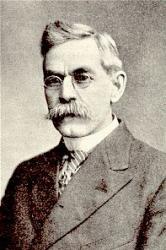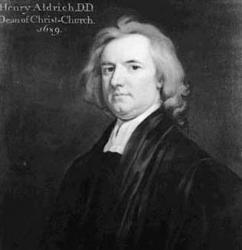Planning worship?
Check out our sister site, ZeteoSearch.org,
for 20+ additional resources related to your search.
- |
User Links
Person Results
Fred A. Fillmore

1856 - 1925 Composer of "[How beautiful upon the mountains]" in Heart Songs Born: May 15, 1856, Paris, Illinois.
Died: November 15, 1925, Terrace Park, Ohio.
Buried: Milford, Ohio.
Frederick Augustus Fillmore, who was born on May 15, 1856, in Paris, IL, one of seven children, five sons and two daughters, born to Augustus Damon and Hannah Lockwood Fillmore. His father was a preacher in the Christian Church, as well as a composer,
songbook compiler, and hymn publisher who developed his own system of musical notation using numbers on the staff in place of note heads. Augustus eventually settled in Cincinnati, OH, and established a music publishing business there. Until 1906, there was no official distinction between "Christian Churches" and "Churches of Christ." The names were used pretty much interchangeably, and many older churches of Christ which are faithful today were once known as "Christian Churches."
Fred and his older brother James took over their father's publishing business following the death of Augustus in 1870 and established the Fillmore Brothers Music House. This became a successful Cincinnati music form, publishing church hymnals and later band and orchestral music. For many years the firm issued a monthly periodical, The Music Messenger. The brothers edited many hymnbooks and produced many songs which became popular. Beginning with the songbook Songs of Glory in 1874, there appeared many Fillmore publications which became widely used through churches, especially in the midwest. For these collections, Fred provided a great deal of hymn tunes.
--launch.groups.yahoo.com/group/hymnoftheday
Fred A. Fillmore
William Crotch

1775 - 1847 Person Name: William Crotch (1775-1847) Composer of "[How beautiful upon the mountains Are the feet of Him that bringeth good tidings]" in Carmina Sanctorum William Crotch (5 July 1775 – 29 December 1847) was an English composer, organist and artist.
Born in Norwich, Norfolk to a master carpenter he showed early musical talent as a child prodigy. The three and a half year old Master William Crotch was taken to London by his ambitious mother, where he not only played on the organ of the Chapel Royal in St James's Palace, but for King George III. The London Magazine of April 1779 records:
He appears to be fondest of solemn tunes and church musick, particularly the 104th Psalm. As soon as he has finished a regular tune, or part of a tune, or played some little fancy notes of his own, he stops, and has some of the pranks of a wanton boy; some of the company then generally give him a cake, an apple, or an orange, to induce him to play again...
Crotch was later to observe that this experience led him to become a rather spoiled child, excessively indulged so that he would perform.
He was for a time organist at Christ Church, Oxford, from which he was later to graduate with a Bachelor of Music degree.
His composition The Captivity of Judah was played at Trinity Hall, Cambridge, on 4 June 1789; his most successful composition in adulthood was the oratorio Palestine (1812). He may have composed the Westminster Chimes in 1793.
In 1797 Crotch was given a professorship at Oxford University, and in 1799 he acquired a doctorate in music. While at Oxford, he became acquainted with the musician and artist John Malchair, and took up sketching. He followed Malchair's style in recording the exact time and date of each of his pictures, and when he met John Constable in London in 1805, he passed the habit along to the more famous artist.
In 1834, to commemorate the installation of the Duke of Wellington as chancellor of the University of Oxford, Crotch penned a second oratorio titled The Captivity of Judah. The 1834 work bears little resemblance to the oratorio he wrote as a child in 1789.
In 1822, Crotch was appointed to the Royal Academy of Music as its first Principal, but resigned ten years later.[2] He spent his last years at his son's house in Taunton, Somerset, where he died suddenly in 1847. Among his notable pupils were William Sterndale Bennett, Lucy Anderson, Stephen Codman, George Job Elvey, Cipriani Potter, and Charles Kensington Salaman
--en.wikipedia.org/
William Crotch
Charles E. Kettle
1833 - 1895 Person Name: Kettle Composer of "[How beautiful upon the mountains]" in Voices of Praise Charles Edward Kettle, 1833-1895
Born: 1833, Bury St. Edmunds, Suffolk, England.
Died: Circa February 1895, Steyning district, Sussex, England.
As of 1881, Kettle lived in Hove, Sussex, where he was an organist.
--www.hymntime.com/tch
Charles E. Kettle
Charles John King
1859 - 1934 Person Name: King Composer of "[How beautiful upon the mountains]" in Voices of Praise
Charles John King
Henry Aldrich

1647 - 1710 Person Name: Aldrich Composer of "[How beautiful upon the mountains]" in Voices of Praise Henry Aldrich, an English composer, born 1657; died 1710; his library is at Oxford College.
A Dictionary of Musical Information by John W. Moore, Boston: Oliver, Ditson & Company, 1876
Henry Aldrich


 My Starred Hymns
My Starred Hymns


